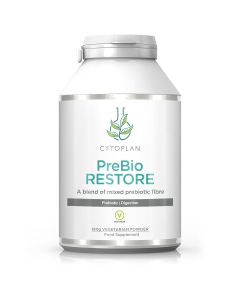What should I eat to support my gut health?
The health of your gut plays a pivotal role in your overall health and wellbeing, from immunity to mental health, hormonal balance to cardiovascular health. Most people can enhance their gut health naturally through diet, and here are the types of foods that can give you the most benefit.
Fibre
Dietary fibre is indigestible carbohydrate, found in plant foods, which can play an important role in maintaining healthy digestion – from feeding your friendly bacteria, to adding bulk to your stools and supporting elimination. Most people are eating well below the current guidelines of 30g daily – but by ensuring plenty of fibre you can support your gut health and beyond – from blood sugar balance, detoxification to cholesterol levels and cardiovascular health.
Great sources of fibre include fruits and vegetables, nuts, seeds, wholegrains, beans and pulses – and these easy-to-follow tips will help you to up your levels:
- Choose wholegrains – such as whole oats and brown rice, instead of white, refined grains which have been stripped of their vitamin-containing germ and fibre-rich bran.
- Swap fruit juice for whole fruit – juice has had the fibre removed and has a high concentration of sugar – instead opt for fruit such as apple or pear, and why not add some nut butter for an added boost of protein, healthy fats and fibre.
- Beans, peas and lentils are great sources of fibre – so throw a handful into your soups and stews, or on top of your salad. Hummus or bean dips with crudites is a great fibre-rich snack.
- Ditch the peeler – peeling your veggies can remove up to half the fibre – so give them a good scrub instead!
- Fill half your plate with veggies – not only will this give you a rich source of fibre but including lots of veggies in your diet can lower your risk of a range of chronic diseases. Make them the main event on your plate.
You should always introduce fibre-rich foods slowly and gradually into your diet to give your gut the chance to adjust and avoid unwanted side effects such as cramps and wind.
Probiotic foods
An imbalance in our gut flora, or “dysbiosis” can lead to several symptoms such as diarrhoea, constipation and abdominal pain. Certain foods have the ability to provide us with natural probiotics, which can in turn support the growth and diversity of our own gut flora and promote good gut health.
Fermented foods such as natural live yoghurt, kefir, sauerkraut, kimchi and kombucha are a great source of gut friendly probiotics – so try to include them in your regular diet.
Prebiotics
Prebiotics are specific types of fibre which can be digested by your gut bacteria. Humans lack the enzymes to digest most prebiotic fibres, so they pass through the small intestine unaffected before being fermented by the microbiota in the large intestine. By providing an energy source for your gut flora, prebiotics can modulate the composition, quantity and function of these microorganisms and have a beneficial effect on gut health.
Rich sources of prebiotics include foods such as onions, garlic, chicory, olives, baked apples and Jerusalem artichoke. The most important way to support diversity and provide a range of prebiotics is to consume a wide range of different wholefoods. A diet with a wide variety of plant foods will support a diverse microbiome – and good gut health. Variety is key (!) – why not set yourself a challenge and aim for 50 different wholefoods per week – including as many different fruit and vegetables as you can, from kale to asparagus, oats to bananas and provide the best support for your gut.
Polyphenols, found in many different plant foods, as well as dark chocolate (at least 70% cocoa) and red wine can also have a prebiotic-like effect and support your gut bacteria – so enjoy them (in moderation!)
Anti-inflammatory
If you are experiencing digestive symptoms such as bloating, altered bowel habits or food sensitivities, it is likely you have an element of inflammation in your gut. The good news is that by supporting your microbiome you might also help to reduce gut inflammation. An anti-inflammatory diet may provide further support:
Include:
- a wide range of vegetables, particularly green leafy veg like kale, spinach and broccoli
-
dark-coloured fruits like cherries and berries
-
healthy fats, such as olive oil, nuts and avocadoes, as well as oily fish
-
green tea
-
pices such as turmeric and ginger – add them into your cooking
Avoid:
- Refined carbohydrates, think white bread, rice, pasta etc.
- Sugary snacks like biscuits, cake, ice cream etc
- Trans fats – margarine and baked goods such as pies and pastries
- Some oils – processed fats such as soybean and corn oil
Water
Staying hydrated could be a very simple way to support your gut health by promoting regular bowel movements (particularly if you’re increasing that fibre!) and drinking plenty of water has also been shown to positively affect our gut flora.
How to eat
While what you eat can undoubtedly support good gut health, how you eat is very important too. It’s easy to eat too much, too quickly if you’re not paying attention, which can cause bloating, gas and indigestion. Take the time to slow down, cut out distractions to focus on your meal, and make sure you chew your food thoroughly. Digestion starts in your mouth and taking the time to chew properly can make the whole digestive process run more smoothly – it has also been shown to reduce stress, which can further improve digestion.





